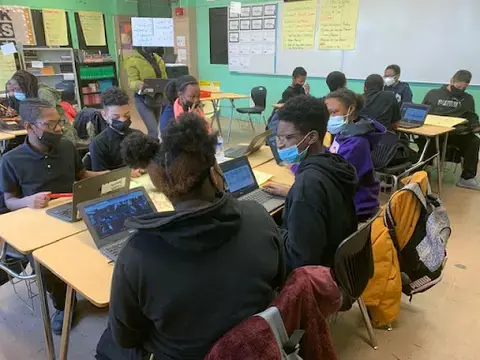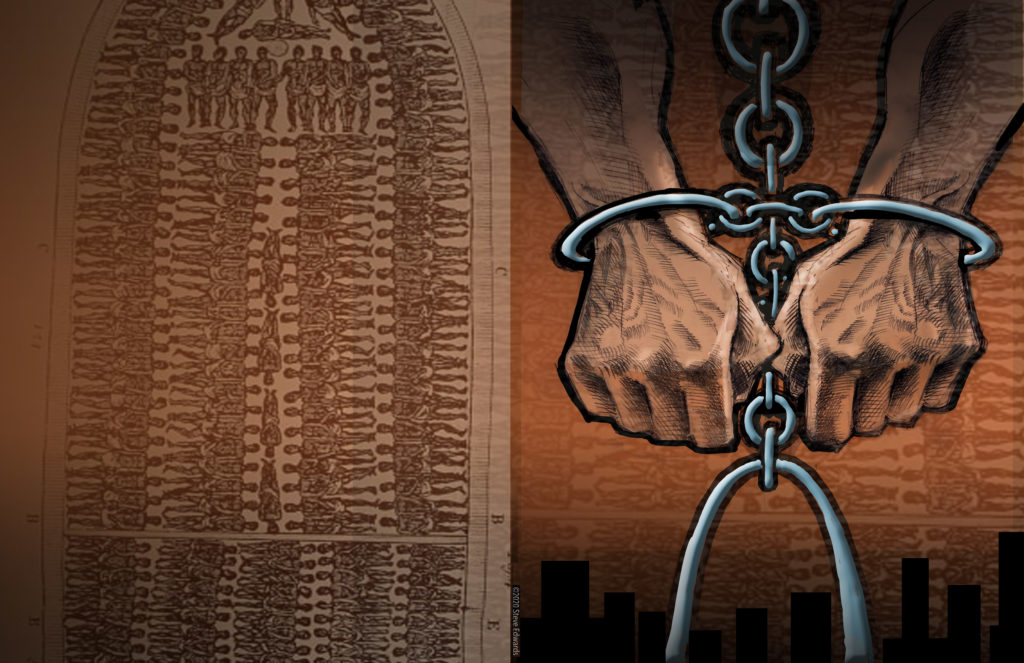This unit was created by Larue Fitch, a middle school social studies teacher in Chicago, IL, as part of the 2021-2022 Pulitzer Center Teacher Fellowship program. It is designed for facilitation across approximately ten 45-minute minute class periods.
For more units created by Pulitzer Center Teacher Fellows in this cohort, click here.
Objectives:
Students will…
- Describe different types of injustices
- Analyze issues that impact their community
- Make connections to global communities facing injustices
Practice solution-centered skills to combat injustices
Objective 1: To provide students with a deeper understanding of race and education.
Objective 2: To increase students’ knowledge and sense of self-worth by having an identity in our curriculum which will transfer to our global society. Students will be able to understand and comprehend material more thoroughly, considering that they are able to see themselves in the curriculum.
Objective 3: To ensure students are aware of injustices and inequalities that occur across the globe. Students will be able to become social justice advocates towards the injustices and inequalities in our global society.
Unit Overview:
The unit addresses the impact that race and education have on global society and its disparities. The premise for this unit stems from my students' multitude of questions and fears when it comes to their identity and how they are seen in America. This is fueled by the events of Sandra Bland, Trayvon Martin, George Floyd, Ahmaud Arbery, and Breonna Taylor, to name a few. The unit offers a range of reading tasks which students will annotate and analyze. Students will connect around the readings in Socratic Seminar. Each selected reading will enable them to reflect on how these events may impact them as a student and community member.
This unit offers a set of higher-order thinking questions and discussion techniques that explore questions regarding race and education that include factual, conceptual, and debatable topics.
Performance Task:
| Argumentative Essay: Students will craft a five to six-paragraph argumentative response to the following question: Do injustices and inequalities affecting historically marginalized communities prevent their ability to develop an authentic identity in our nation? Students will include notes from their collaborative discussions and cite the following texts in their essay: * Our Deepest Fear * “AP Road Trip: Racial Tensions in America's 'Sundown Towns'” by Tim Sullivan, Noreen Nasir, and May-E Wong for Associated Press * “The 1857 Project: Extracting the Poison of Racism From America’s Soul” by William Frievogel for Gateway Journalism Review “63106 & Me” by Sylvestor Brown for The St. Louis American * “Better Angels: For One St. Louis Family the Long Road to Social Justice Began Generations Ago” by Richard Wiley and Richard Weiss for The St. Louis Post-Dispatch This composition will demonstrate students mastery from a combination of activities conducted throughout the unit, including: * Socratic Seminar * Discussion and Question (DOK Level 3-4) * Pulitzer Articles * Notes Resources for Teaching Argumentative Essay: * Outline of an Argumentative Essay - Classical Pattern * How to Write a Good Argumentative Essay: Easy Step-by-Step Guide by Malcolm Gladwell * Argumentative Performance Task Writing Rubric (Grades 6 – 11), Smarter Balanced Argumentative essays are graded using the following rubric: Argumentative Performance Task Writing Rubric (Grades 6 – 11), Smarter Balanced |
Ten-lesson unit plan for teachers, including pacing, texts and multimedia resources, guiding questions for group discussions, and performance task instructions and grading rubric for projects.
Unit Resources:
Common Core Standards:
CCSS.ELA-LITERACY.RI.6.1; Cite textual evidence to support analysis of what the text says explicitly as well as inferences drawn from the text.
CCSS.ELA-LITERACY.RI.6.2: Determine a central idea of a text and how it is conveyed through particular details; provide a summary of the text distinct from personal opinions or judgments.
CCSS.ELA-LITERACY.RI.6.3: Analyze in detail how a key individual, event, or idea is introduced, illustrated, and elaborated in a text (e.g., through examples or anecdotes).
CCSS.ELA-LITERACY.RI.6.4: Determine the meaning of words and phrases as they are used in a text, including figurative, connotative, and technical meanings.
CCSS.ELA-LITERACY.RI.6.5: Analyze how a particular sentence, paragraph, chapter, or section fits into the overall structure of a text and contributes to the development of the ideas.
CCSS.ELA-LITERACY.RI.6.6: Determine an author's point of view or purpose in a text and explain how it is conveyed in the text.
CCSS.ELA-LITERACY.RI.6.7: Integrate information presented in different media or formats (e.g., visually, quantitatively) as well as in words to develop a coherent understanding of a topic or issue.
CCSS.ELA-LITERACY.RI.6.8: Trace and evaluate the argument and specific claims in a text, distinguishing claims that are supported by reasons and evidence from claims that are not.
CCSS.ELA-LITERACY.RI.6.9: Compare and contrast one author's presentation of events with that of another (e.g., a memoir written by and a biography on the same person).
CCSS.ELA-LITERACY.RI.6.10: By the end of the year, read and comprehend literary nonfiction in the grades 6-8 text complexity band proficiently, with scaffolding as needed at the high end of the range.
Bookend Standards
Formative assessments, which are aligned to a scope and sequence; will require proficiency of 70% or above to fulfill the rubric. Students will be able to read and comprehend complex literary and informational texts independently and proficiently.
"Literature opens a door through which we can see the effects of social evils on people. It can sensitize us to the wounds of poverty, of social stigma, of injustice. It can fuel our empathy and broaden our world-view."
Student in Chicago, IL as part of the unit self-identity in today's new America in spring 2022

"Fairness is a lot more than we think. It is not only making sure that everyone is treated the same. It encourages respect, responsibility, leadership, trust and a life that matters. All of these things affect a community."
STUDENT IN CHICAGO, IL AS PART OF THE UNIT SELF-IDENTITY IN TODAY'S NEW AMERICA IN SPRING 2022












